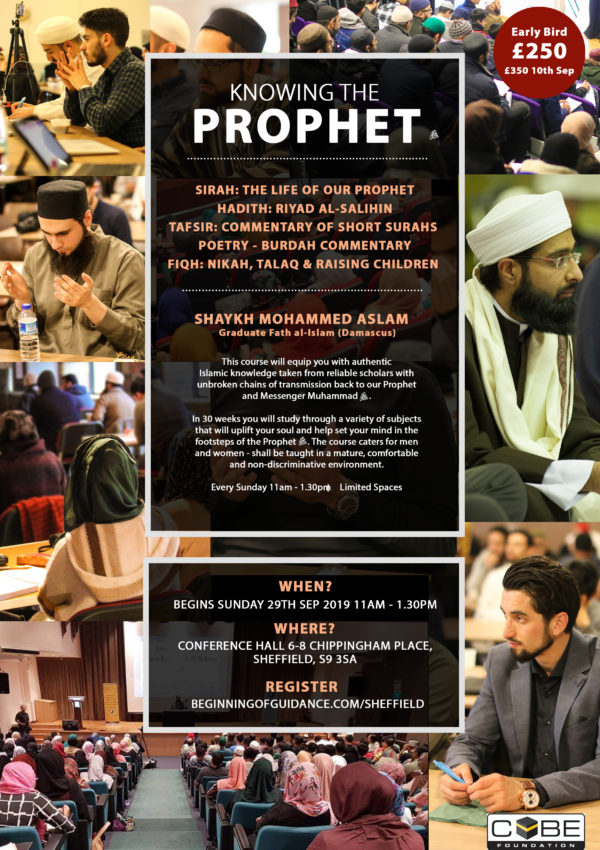Subjects
-
Tafsir: Surah al-Fatiha and the last 12 Surahs (oft-recited Surahs)
- Understanding the meanings of the Qur’an is the key to achieving deeper levels of reflection and appreciation of our Lord’s address. With more understanding one can achieve a greater connection to the Qur’an and reverence for it, finding serenity in remembrance of Allah through recitation of His Book, ultimately drawing ever closer to Allah and becoming one of the people of the Qur’an in following the example of the Prophet. Drawing on classical commentaries, we shall be expanding on the meanings of the verses we most often recite in our daily worship, allowing us to bring more life into our worship. Classes will provide an in-depth explanation of the shorter, more commonly recited Suras of the Qur’an: Sura al Fatiha and the last twelve Surahs of the Qur’an. There will also be a detailed explanation of the Basmalah, and what we really mean when we seek refuge from the devil before reciting the Qur’an, as well as its virtues and how to rectify our intention when reciting it.Example of things we will study: Where was Surah Fatihah revealed? What are the virtues of Surah Fatihah? What are the benefits of reciting Surah Falaq and Surah Nas? How can we protect ourselves through the Quran? Why is Surah Ikhlas one of the most beloved Surahs in the Qur’an? What was the reason for the revelation of Surah Masad? What are the hidden meanings in Surah Nasr? How lessons can we take from Surah Kafirun in our time? Surah Kawthar is the shortest Surah in the Quran but why is it so significant?
-
Sirah (The Prophet’s Blessed Life)
Rasūlullāh ﷺ was the most handsome of men. He had the most beautiful of voices and the most truthful of speech. No eye saw anyone greater than him and no mother gave birth to anyone more excellent. His generosity was so great that it humbled kings. No one left him with a need except that he fulfilled it for them. No one asked him for anything except that he gave them it. He never said, ‘No’. Despite his majestic rank, he chose a life of simplicity and would go hungry so others could eat. He was a leader that walked behind his Companions and they loved him more than their own lives. He lived much of his life on milk and dates – and he distributed everything in his home to the poor. He played with children, showed kindness to women, honoured the elderly, and showed mercy to animals. He loved us before we came into this world and he yearned to meet before but we were born. Words and expression will come to an end but nothing can do justice to his beauty and elect character. It is a must upon all those who believer to learn about such a noble and great man ﷺ so that they can refine their characters, beauty their characters, improve their family lives, and ultimately gain a closer relationship to Allah.
Example of things we will study: Why do we have to learn the Sirah? Who is part of the lineage of the Prophet ﷺ? What significant events occured just before the birth of the Messenger of Allah ﷺ? Did the Prophet lose any of his parents whilst he was child ﷺ? When did he get married? What happened during the period of revelation? Did the Prophet go through any struggles and hardship? What battles did he participate in? What happened during the Night Journey to Masjid al-Aqsa and the Ascension? Why did he migrate from Makkah to Madinah? How did he deal with losing children and family members? How do we answer criticisms brought forth by the orientalists?
-
Hadith: Selection of Hadith from Riyad al-Salihin
Riyad al-Salihin by al-Imam al-Nawawi is one of the most accepted and renowned works of Hadith ever compiled. We will be studying through essential and fundamental concepts of Islam which, in turn, construct the minimum level of required revealed knowledge for every single Muslim. The narrations will cover topics such as how to increase God-consciousness (Taqwa), the importance of earning halal provision, repentance, turning back to Allah and how to earn Allah’s forgiveness, improving family life, the importance of upholding family ties, the rank of those who serve humanity, and much more. Students will be honoured to study hadith which comprehensively covers every key principle of this religion. This subject will teach the seeker to reconnect to Allah through acts of virtue, honour and nobility
-
Fiqh: Nikah, Talaq & Raising Children (Imam al-Ghazali)
“We have a week of celebrations including a mendhi, a nikah, a walima, a long drawn out emotional farewell ceremony, wardrobe of clothing, cars, food to feed armies, and a luxury 7* dubai honeymoon – and then – after splashing all that cash and planning the whole thing for over a year – people are getting divorced in a couple of day or months. We all have had stories of people who went on a honeymoon together on one plane and then returned on different planes from different airports because they decided to get divorced. We need to teach people how to stay married more than teaching them how to party for a marriage. We’ve made the sanctity of nikah cheap but all the preparations concerning it expensive. A nikah is not meant to last just for a week in Buruj al-Arab. It’s meant to last for a lifetime.” Who is it that we should be aiming to marry? What advice did the Prophet ﷺ give about weddings? Is domestic violence and abuse acceptable?
In a time of bewilderment, indoctrination and mass-confusion where true guidance and reality has been covered up and muddled up with that which is precarious, detrimental and extremely scary – it is essential that we come together to learn how to raise our children in accordance to the Prophetic model. The Messenger of Allah ﷺ said, Every one of you is a shepherd and is responsible for his flock. The leader of people is a guardian and is responsible for his subjects. A man is the guardian of his family and he is responsible for them. A woman is the guardian of her husband’s home and his children and she is responsible for them. He ﷺ said, “Teach your children three qualities: the love of your Prophet, the love of his Family and the recital of the Qur’an.” Imam al-Ghazali said that children should be shielded and protected from those matters which are beyond their age and they should be protected from those who try to ingrain it within them – lest it plants the seed of confusion in their hearts. Our religion is so meticulous and careful when it comes to nurturing and raising children that women would be taught to make constant Zikr and Salawat whilst pregnant so the child could benefit from the blessings and light of the Qur’an. Once children were born – mothers would breastfeed in a state of wudhu and only the righteous would be selected as wet nurses so the child could be nurtured upon piety and goodness. As young kids, they would be taught about Allāh, Rasūlullāh ﷺ, the importance of good intentions and service to others.
Imam al-Ghazali also said the hearts of children are pure and clean mirrors – they only reflect that which they are habituated upon. If their upbringing and their nurturing is righteous – they will grow to be righteous. If they are taught that which is vulgar, unnatural and bad – then it will impact their lives, and their hearts will desist from knowing and accepting the truth. Join us for this extremely important subject where we shall be aiming to improve our marriages and learning how to be better parents.
-
Commentary of Qasida al-Burda
Imam Sharaf al-Din al-Busiri’s al-Kawakib al-Duriya Fi Madih al-Khayr al-Buriyah also famously as al-Burdah is one of the most renowned poems ever penned. It has traditionally been recited in seminaries and homes across the Muslim world for centuries, and it has been accepted in the hearts of millions across the globe due to the beauty of its language, the radiance of its meanings, and the illumination of its secrets. The poem is immersed in the love, honour, and reverence of our master Muhammad ﷺ and his noble family and Companions; every line is filled with the deepest levels of devotion and veneration for the greatest man Allah ever created, and every word was written with the pinnacles of yearning and longing for his blessed proximity. Indeed, the Burdah is an ocean of blessings and goodness for all those who study it, and it is a means for cure and rectification for all those recite it.
Term 1
Sun 29th Sept – Sun 15th Dec 2019
Term 2
Sun 5th Jan– Sun 29th March 2020
Term 3
Sun 31st May– Sun 28th Jun 2020
Class Setting
Chairs and tables
Men & Women Welcome
Students must be 18+
Questions & More Info
info@cityofknowledge.co.uk


